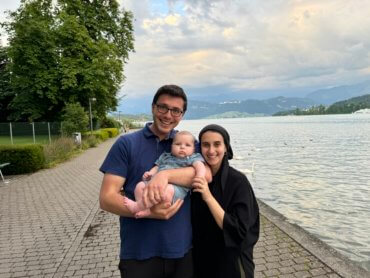Dr. Sheila Nazrian on Fleeing Iran, Forced Antisemitism and Becoming a Voice for Good
Dr. Sheila Nazarian star of the Netflix show Skin Decision, is a proud Iranian Jewish woman, who uses her social platform to stand up to Jew hatred. In honor of Persian Heritage month, we sat down with Dr. Nazarian to learn more about her traditional Jewish life in Iran before her family was forced to flee, during the Iranian Revolution.
Dr. Nazarian was born in 1979, in the midst of the Revolution. Her parents took note of the political climate in Iran, and decided that if they ever needed asylum then having at least one child with US citizenship would be beneficial. When her mother was eight months pregnant, Sheila’s parents flew to New York where they already had a number of family members, and Sheila was born in Long Island. They flew back to Iran about four weeks later.
By then, the Iranian Revolution and Iran-Iraq War were in full swing. In this period, many Jews in Iran hid their Jewishness; changing one’s last name to do so was common practice. Sheila had a number of Jewish friends while in preschool in Iran… which she only learned when she saw them later in school in Los Angeles, after they too had escaped the country. “We didn’t pretend [to be Muslim],” she says, “we just didn’t say anything.” Because Islamic prayers were taught in Iranian schools as a cultural given, it wasn’t hard to play along. No one put mezuzot on the door, much less any decorations during the holidays.
In 1985, the political and social situation in Iran only continued to worsen. Sheila’s parents looked at their two daughters and knew that there was no future for them in Iran. Antisemitic persecution increased rapidly as well, with continued violence. So, they planned their escape. Sheila explains that her parents planned to separate their exodus into two parts: their father leaving alone, followed by their mother and the children. This was so if one of the adults got caught, the other would still be able to take care of the children.
“My dad said he was going to a medical conference in the United States, and left the passports of me, my mother, and my sister with the government, and flew out to Vienna,” she said. There, he stayed with one of his colleagues and became a translator and informal doctor for HIAS, a nonprofit organization that helps people seek asylum. From there, he tried to get visas for his wife and daughters.
At the time, Sheila was six-and-a-half and her sister was thirteen. “I remember when we were seeing the bombs land from Iraq, my mom would say that they were fireworks,” Sheila says, describing how her mother tried to explain the dangerous situation to a child. Additionally, Sheila wasn’t told about the family’s escape until it was in full swing so she wouldn’t leak information to her friends. Sheila was only told what was happening in bits and pieces that a child could understand, and so their escape felt like a big adventure.
The Journey
A week after their father left for Vienna, they and their mother were hidden in a dedicated truck under burlap and corn, and were subsequently smuggled out of the bazaar to the border. “My mother told me that we were going on a roller coaster ride through the desert,” Sheila explains.. “I remember we were in a bathroom that was basically a clay shack with a hole in the ground as we were getting closer to the border. My mother said that we were going to America, and all I could think of was that we were going to meet Michael Jackson.” The illegal vendors lined the streets of Iran, selling bootlegs of American pop stars like Jackson and Madonna; “I learned the Thriller dance in Iran, and so that was what America meant to me.”
The asylum-seekers were spotted by border police on the second night, who shot at the group of refugees in the darkness. The truck began moving so quickly that everyone had to stay pressed to the floor so they wouldn’t fly out of the truck bed. They ultimately got away by crossing a ravine that the border police deemed too dangerous to traverse. Upon making it to Pakistan, the trio stayed with others who were waiting to be smuggled out: be they Muslim (particularly those who were affiliated with the Shah or his military), Jewish, or otherwise. She recognized some people from this liminal period later in life as well.
Eventually, the family of four were reunited in Vienna, and remained there for another three months as their asylum applications were processed. When they finally arrived in the United States, the family lived in New York for about a month. Sheila remembers celebrating her seventh birthday at her grandmother’s house in Queens. After that, they relocated to Los Angeles, “where the weather was better,” she jokes. They were finally in a place they could be themselves.
Forced Antisemitism
Despite many periods which were rife with antisemitism, there were also times when the relationship between Jews and Muslims were good. Dr. Nazarian points out that Jewish and Muslim neighbors would constantly borrow sugar from each other, invite each other over for a chat or dinner, and celebrate life events together. The history of Jewish-Muslim kinship is strong, and was unfortunately interrupted by external forces and created divisions.
Dr. Nazarian recently hosted Masih Alinejad — an acclaimed Iranian-American journalist and womens’ rights activist, who is extremely vocal in current events — in her home recently. During that time, the two women had a conversation about Iran’s history of religious persecution and morality police brutality starting from the 1970s. Dr. Nazarian confessed that while she’s posted regularly on social media in defense of Israel, she initially hadn’t been particularly motivated to do so for Iran, despite being Iranian-born because she felt betrayed when her Muslim countrymen didn’t stand up for their Jews decades ago.
After calling Dr. Nazarian a “badass” for calling out Iranian humanitarian activism on its past negligence, Masih confessed that as a child in Iran, she’d been taught to wish death on many people: something that no child should do. When the Jews were persecuted, she’d said, “well, we’re not Jewish, so why should we care?”
For many Iranians, this rhetoric repeated until Mahsa Amini’s arrest and death in September 2022 for the crime of not wearing a hijab. Now, the women’s rights movement in Iran has exploded, growing more and more vocal each day. “When it happened to Mahsa, we said we were all Mahsa,” Masih said, in reference to women’s oppression by the government, “and we decided to care.”
Prior to the Islamic Revolution in Iran, Jews were treated rather well. Many of the Jews who fled Spain and Portugal during the Inquisition ended up in Iran, particularly in the city of Kashan. There are a number of distinct Iranian Jewish communities, and Sheila explains that there are jokes that every city in Iran has stereotypes about the characteristics of its inhabitants. However, most of the customs of Iranian Jews are similar.
While Iran was a place of asylum to refugees from the Inquisition, times change: in both the far and near past, life for Jews was incredibly difficult in Iran. In a long list of exiles and exoduses out of Arab countries in the mid-1900s, over 650,000 Iranian Jews left after the Revolution — mostly to Israel.
“Antisemitism is the canary in the coal mine,” Dr. Nazarian says. “‘If they come for me today, they’ll come for you tomorrow.’ Iran is an excellent example of this.”
This is not an unfamiliar story. “The wandering Jew” is a trope that is all too accurate for our people. Jews have no land in which we can live for generations upon generations. Dr Nazarian recounts another recent conversation, this time with a colleague at a conference. This colleague was showing her a property that he’d proudly declared has been in his family for generations. “No Jewish person I know can say that a land has been in their family for generations, because we’ve all been kicked out of every land we’ve been to.”
When reflecting on the desperate movement of Jews constantly seeking asylum across the globe, Dr Nazarian has a powerful insight. “What we hold onto are our values, our cultural traditions, our education: that’s what’s in our suitcase.”
If you found this content meaningful and want to help further our mission through our Keter, Makom, and Tikun branches, please consider becoming a Change Maker today.








1 comment
Sort by
Intriguing stuff and one reason to reconsider revisiting Spain after 50 years. We Jewish Israelis are faced with the dilemma over enjoying the wealth and beauty European culture as against staying home in Israel and visiting seemingly friendly non-European countries only (such as Thailand and Japan).